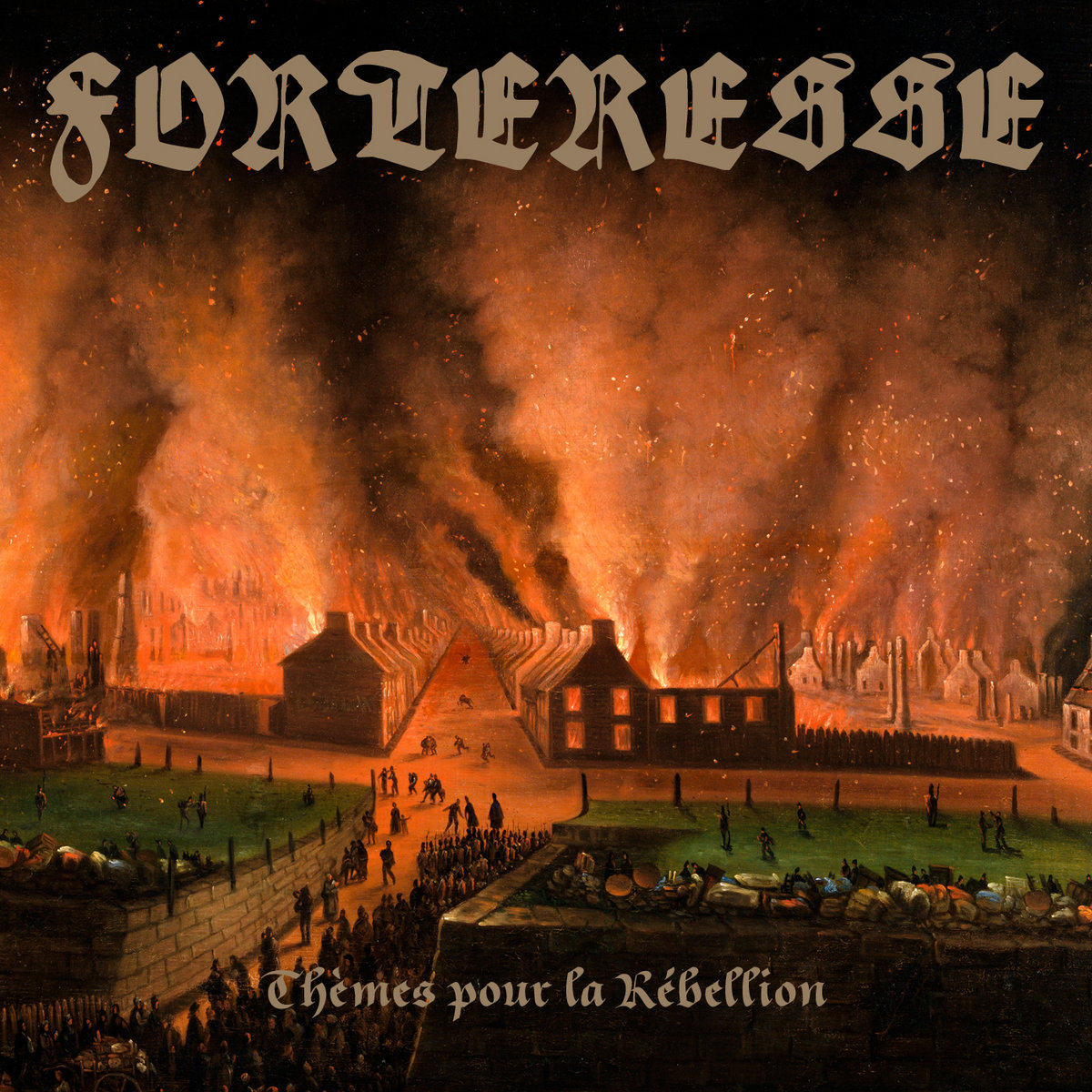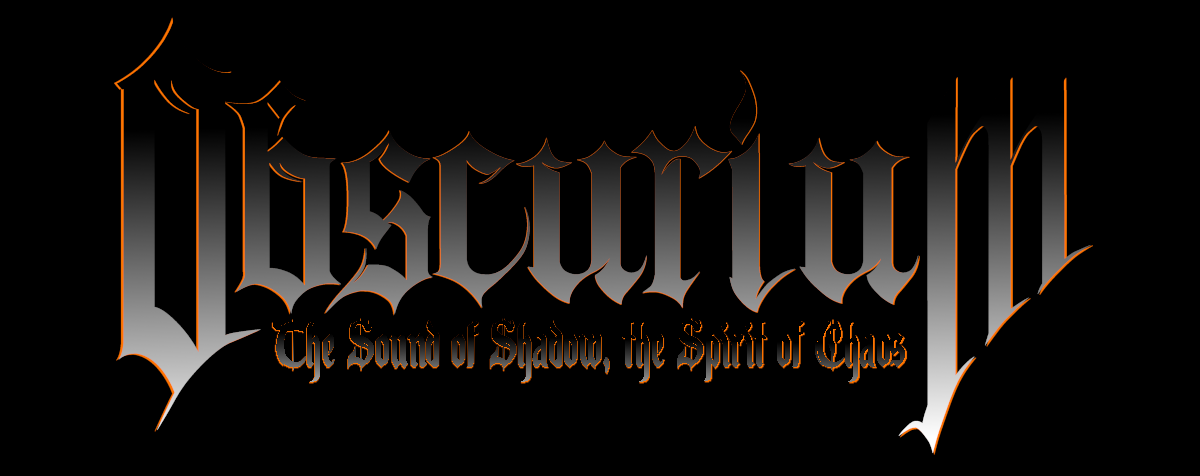This review is not intended to promote a new release, nor to highlight a partner or a recent launch. It focuses instead on a milestone album in the history of Québécois black metal: Thèmes pour la Rébellion by Forteresse.

Released several years ago, this opus remains an essential work, both for its musical strength, a true surge of proud and heroic riffs carried by a breath of hope, and for the depth of the message it conveys. The album does not merely invoke the spirit of revolt: it embodies the memory of a people and the persistence of their identity.
In these particular times when the question of sovereignty has resurfaced in our media and conversations, it is healthy to remember what this heritage truly represents. All the more so as it becomes necessary to respond to caricatures coming from elsewhere, notably from certain French circles called “antifa,” quick to stick defamatory labels without understanding the context they judge.
For them, any symbol of attachment to the land and culture seems suspicious. They confuse national memory with extreme ideology, incapable of distinguishing a people’s history from the propaganda they claim to fight. And while they brandish their façade slogans, shouting that “everyone hates racists,” they are seen striking with sticks those who dare carry the flag of the Patriotes, a symbol of a rebellion born against oppression.
But make no mistake: the subject here is not these rootless groups. It is a matter of reminding that, in a province where everything seems arranged to stifle the Québécois spirit, from subsidized culture to political and media discourse, Forteresse rekindles a flame that many would like to see extinguished.
It is therefore in an attempt to set the record straight, with humility but sincere conviction, that Obscurium Webzine dedicates this review to Forteresse. It will be divided into two parts:
- A first part focused on the music itself, the classic review, where we will discuss the structure, power, and breath of the album.
- A second part devoted to the history of the Patriotes of 1837, in order to understand the roots of the theme and the symbolic significance of this rebellion in Québécois memory.
For to grasp Thèmes pour la Rébellion, one must not only listen to the notes, but also hear the past that rekindles within them, that of a people who refused to bow before the Empire.
Forteresse – Thèmes pour la Rébellion (Review)

There is in Thèmes pour la Rébellion an ancient breath, a wind that crosses time. One enters it as if passing through a forgotten threshold, carried by a cry from the heart that seeks neither trend nor effect. Forteresse regains the vigor of its beginnings here, but with a new clarity, an energy that resonates as much in the ear as in memory.
The guitars trace clear, full-of-life melodies, never lost in cacophony. The riffs go straight to the point, carried by a drumbeat at a steady pace, like a march toward an ideal. The production, clearer than on earlier albums, gives each instrument the space it deserves. One feels the rigor of the band, this will to pay tribute to something larger than themselves.
The album exudes a sense of heroic hope. Not blind violence, but a force that lifts. Each track tells a chapter of the struggle: pride, loss, perseverance. One thinks of the elders, those who stood their ground, and the idea that rebellion, above all, is a matter of dignity.
Critics have often noted that Thèmes pour la Rébellion marks a turning point. More direct, more alive. Where some bands lose themselves in atmosphere or overproduction, Forteresse stays on course. The melodies breathe, the transitions are natural, and even in moments of fury, one feels a human hand behind every note.
There is also something deeply Québécois in this album, not just in the lyrics or themes, but in the tone, in the way it blends melancholy with courage. Music rooted in the land, unpretentious, but full of conviction.
In short, Thèmes pour la Rébellion is more than an album: it is a declaration. A reminder that music can be an act of memory, and that beyond the noise and the controversies, it continues to speak to those who still know how to listen.
Support these bands by purchasing their merch directly from the labels they have signed with. In the case of this album, it is available through Sepulchral Productions. A small reminder as well: Forteresse will be present at La Messe des Morts this year.
- Bandcamp: https://forteresseqc.bandcamp.com/
- Facebook: https://www.facebook.com/profile.php?id=100045145178236
- Instagram: https://www.instagram.com/forteresse.qc/
The Patriotes and the Rebellion of 1837
Before discussing the battles and their outcomes, it is important to recall who the Patriotes were and why they rose up against the British colonial government.
At the beginning of the 19th century, Lower Canada (today’s Quebec) was governed by elites loyal to London. The Patriotes, mainly from the French-speaking rural population, demanded more political rights, better representation, and an end to the economic and social injustices weighing on them. They sought to protect their language, culture, and autonomy against a power that ignored and oppressed them.
The movement grew with the Society of the Sons of Liberty, which organized gatherings, petitions, and symbolic actions to pressure the government. Tensions quickly rose, and faced with the British refusal to negotiate, some Patriotes decided to take up arms, marking the beginning of the 1837 rebellion.
This first historical section helps to understand that the revolt was not a simple impulsive act: it was the result of a long process of frustration and resistance, deeply rooted in the identity and collective memory of the Québécois people.
The Battles of 1837
The 1837 rebellion focused on three major confrontations, which showed both the courage of the Patriotes and the limits of their movement against a well-organized government.
- Saint-Denis (November 23, 1837): this was the only victory of the Patriotes. Under the leadership of Wolfred Nelson, they succeeded in repelling the British troops. This victory, although symbolic, gave a breath of hope to the entire movement and showed that resistance was possible.
- Saint-Charles (November 25, 1837): only two days later, the Patriotes were defeated by the colonial forces. This defeat dealt a heavy blow to their morale and marked the beginning of the gradual retreat of the rebellion.
- Saint-Eustache (December 14, 1837): the decisive battle that ended the November revolt. The village was crushed and burned, and the Patriote losses were heavy. The repression that followed was relentless, with numerous arrests and executions.
These three battles show that despite their courage and determination, the Patriotes faced a far stronger power. But history will remember above all their audacity and their will to defend their dignity, even in defeat.
The Consequences and the Symbol of the Rebellion
After the defeat at Saint-Eustache, the repression was severe. Many Patriotes were captured and hanged, others were deported or imprisoned. These tragic events deeply marked the memory of Quebec and turned the Patriotes into symbols of courage, resistance, and dignity in the face of oppression.
This is exactly what Forteresse seeks to convey in Thèmes pour la Rébellion. Each note, each riff, each refrain evokes not only strength and heroic hope but also the weight of history and the memory of those who stood up to superior forces. The album thus becomes a sonic tribute, a way to keep the memory of the Patriotes alive and to remind that rebellion is, above all, a matter of dignity and loyalty to one’s convictions.
*I am not a historian, but I wanted to add a bit of context to this review. It is possible that some errors have slipped into this text. For those who wish to explore the subject further, here are some reference works on the Patriotes and the rebellion of 1837.
Films
- “Febbre 1837” / “Les Patriotes” (1990, Pierre Falardeau)
A must-see classic, this is Falardeau’s film on the rebellions in Lower Canada. Very historically accurate, it portrays the Patriotes as figures of courage and resistance. - “Quand je serai parti… vous vivrez encore” (1998, Pierre Falardeau)
A lesser-known film, but it also deals with the history of Quebecois struggles and patriotic engagement. - “Les Ordres” (1974, Michel Brault)
Although centered on the October Crisis of 1970, it depicts the repression of a people and their resistance, symbolically linking to the memory of the Patriotes.
Books
- “Le Temps des Patriotes” (Lise Bissonnette, 1992)
An excellent historical synthesis on the Patriotes and the 1837 rebellion. Accessible and rigorous. - “Les Patriotes de 1837-1838” (Yvan Lamonde)
A detailed study of the events, battles, and key figures. - “1837: Les Rébellions des Patriotes” (Gérard Filteau)
A highly documented work on the social and political context, as well as the memory of the Patriotes. - Pierre Falardeau, essays and texts
Beyond his films, Falardeau wrote several texts and interviews on Quebecois nationalism and the memory of the Patriotes, often published in L’Aut’Journal or collected in anthologies.
